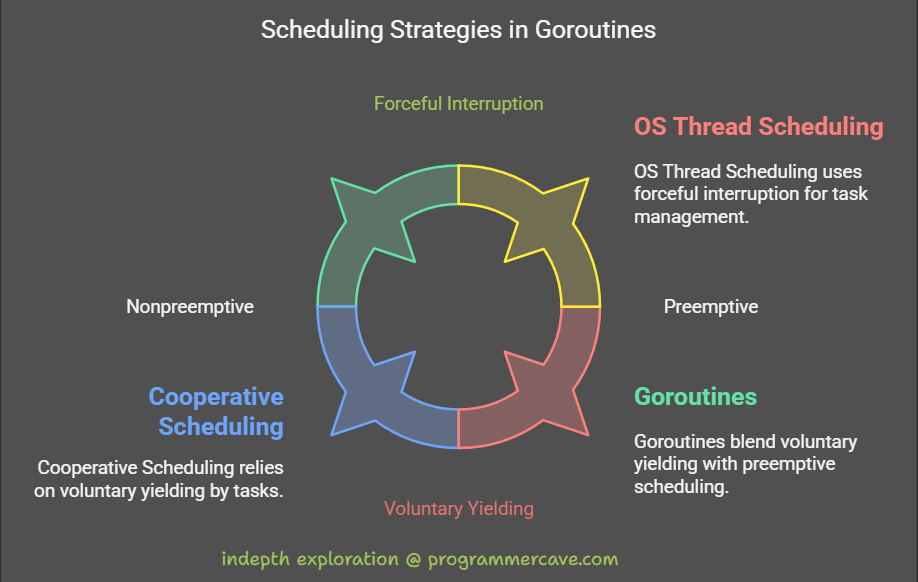Goroutine Scheduling: Preemptive or Nonpreemptive?
Understanding whether Goroutines are preemptively or nonpreemptively scheduled is critical for writing efficient concurrent code. Let’s break down how Go’s runtime manages Goroutines and why this hybrid model is unique.

Preemptive vs. Nonpreemptive Scheduling
-
Preemptive Scheduling:
- The scheduler can forcefully pause a running task (e.g., an OS thread) at any time to allow other tasks to run.
- Common in OS-level thread scheduling.
- Example: A thread running a loop can be interrupted mid-execution.
-
Nonpreemptive (Cooperative) Scheduling:
- Tasks voluntarily yield control at defined points (e.g., during I/O waits).
- Requires tasks to explicitly release resources.
- Example: A function must call
yield()to let another task run.
Goroutines: A Hybrid Approach
Goroutines blend nonpreemptive and preemptive behaviors. Here’s how it works:
1. Default Behavior (Cooperative)
Goroutines voluntarily yield control when they hit blocking operations like:
- I/O operations (e.g., reading a file).
- Channel sends/receives.
- System calls (e.g., network requests).
- Sleep (
time.Sleep).
Example:
func main() {
go func() {
fmt.Println("Goroutine 1")
time.Sleep(100 * time.Millisecond) // Yield point
}()
go func() { fmt.Println("Goroutine 2") }()
time.Sleep(time.Second)
}
Here, time.Sleep creates a yield point, allowing the scheduler to run other Goroutines.
2. Preemptive-Like Behavior (Since Go 1.14)
For CPU-bound tasks (e.g., loops without blocking calls), Go introduced asynchronous preemption to prevent starvation:
- The runtime uses OS signals (e.g.,
SIGURGon Unix) to interrupt long-running Goroutines. - This allows the scheduler to fairly allocate CPU time across all Goroutines.
Example:
func main() {
go func() {
for {
// CPU-bound loop (no blocking calls)
}
}()
go func() { fmt.Println("Goroutine 2") }()
time.Sleep(time.Second)
}
Before Go 1.14, the infinite loop could block other Goroutines. Now, the scheduler preempts it.
Key Implications
-
Developers Don’t Need to Manually Yield
- The Go runtime handles suspension/resumption automatically.
- Blocking operations or long CPU tasks no longer freeze the program.
-
Safe Points for Preemption
- Preemption occurs at function prologues (entry points of functions).
- The compiler inserts checks to ensure safe interruption.
-
Fairness
- Ensures no single Goroutine monopolizes the CPU.
Summary
- Goroutines use nonpreemptive scheduling by default (yield at blocking points).
- Preemptive-like behavior was added in Go 1.14 for CPU-bound tasks.
- The hybrid model simplifies concurrency: no manual yielding, no starvation.